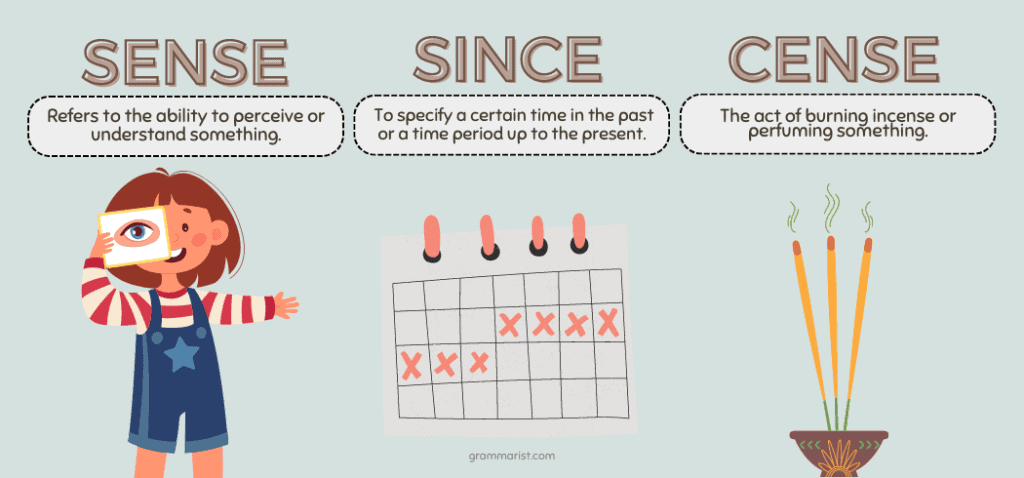I know most languages have homophones, but I doubt as many as English does. Not only do we have pairs of words that sound the same with different meanings, but we also even have trios of words that are homophones of each other. Take sense, since, and cense, for example.
Three different terms with different definitions, but they sound the same and are even spelled similarly. So, let’s break down their key differences and give you some tips to remember when you’re writing.
Sense vs Since vs Cense: Meanings Explained

“Sense” is classed as a noun that refers to the ability to perceive or understand something, like with one of the five senses (sight, smell, taste, touch, and hearing). It can also refer to a feeling or intuition.
- I can sense a hint of rosemary in this pasta sauce.
- I’m getting the sense of death in this room.
The term “since” is a preposition, conjunction, as well as an adverb that we can use to specify a certain time in the past or a time period up to the present. But it can also be used to show cause or reason.
- I’ve been listening to Metallica ever since I was ten years old.
- Since you’ll be going to town tomorrow, can you buy me some milk?
“Cense” is an uncommon verb that we use to refer to the act of burning incense or perfuming something, usually as part of a religious ritual, but it can be applied to any situation where you’re using smelling things.
- I’m censing the couch with Febreze.
- I like to cense the air in my office each day before I start work.
How Do You Spell Sense, Since, and Cense?
It’s important to get the spelling right for these three words as that’s really the only thing that sets them apart on paper. This is how you should spell each one.
- “Sense” is spelled s-e-n-s-e.
- “Since” is meant to be s-i-n-c-e.
- And “cense” is spelled as c-e-n-s-e.
As for pronunciation, they’re considered homophones and all sound like senn-se but I know some people say “since” and give a slight tweak to the “I” sound so it’s sin-se.
Trick to Remember the Difference
Here are my tricks to remember the difference between “sense,” “since,” and “cense.”
- “Sense” is related to perception and understanding, so remember “s” for “sensation.”
- “Since” goes hand in hand with time or cause, so just remember “i” for “interval” or “instance.”
- “Cense” is usually used with burning incense or perfuming, so just think of “c” for “ceremony” or “cleansing.
Since Examples in a Sentence
- I haven’t seen my mother since last year.
- He’s been working on the project since January and expects to finish by the summer.
- Alice, since you were late, we started the meeting without you, so catch up with the others afterward.
- The local candy store has been closed since the hurricane hit.
Sense Examples in a Sentence

- Eliza has a great sense of humor that anyone can relate to.
- Common sense is dead these days.
- I had a crazy sense of déjà vu when I entered the foreign room.
- I’ve got an amazing sense of hearing…and sense of hunger.
- My sister has a killer fashion sense.
- David’s decision about our publishing plans made no sense to me.
- My husband and family give me a strong sense of security.
- My dog’s keen sense of smell helped locate the missing kid from next door.
Cense Examples in a Sentence
- The priest began to cense the altar during the ceremony before my daughter’s christening.
- I watched as they censed the room to purify it before the ritual.
- The aroma of the heavily censed incense filled the air and was almost enough to choke me.
- My friend is a Wiccan and carefully censed the sacred objects she bought at the thrift store as part of her tradition.
More than Five Senses
See how easy it is to mix these three words up? But it’s super important to get them right when you’re writing the English language because of their different definitions. Just refer back to this guide whenever you forget, but keep in mind that sense = sensation, since = instance, and cense = incense.
